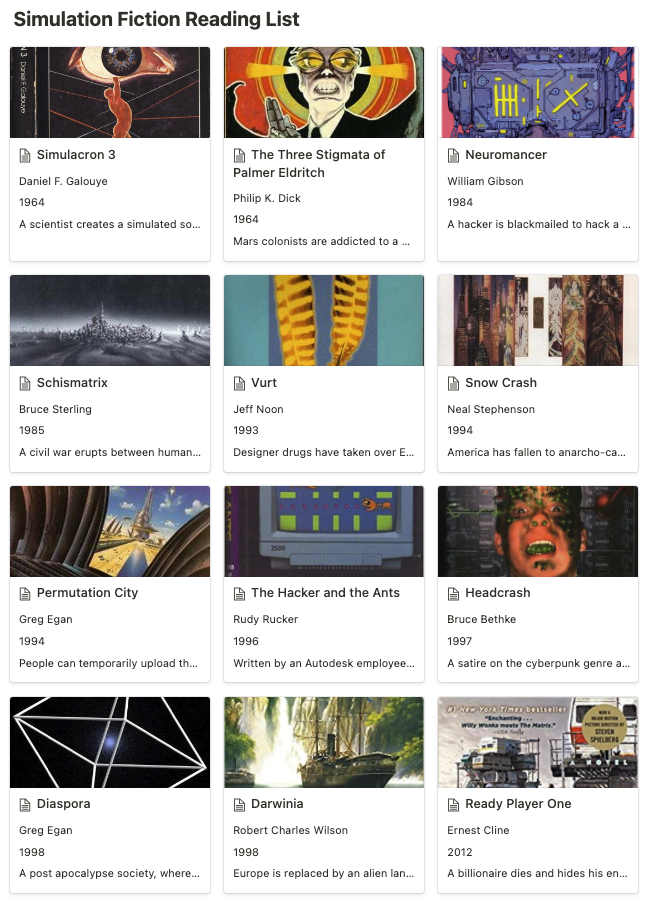📖 Simulation Fiction
Fiction about the implications of VR is way older than we think. Since 1909, we’ve been crafting stories about technology-induced transrealism, and the effects on consciousness and society.
Metaverse day-dreaming is way older than Snow Crash
The idea of a Metaverse has been at the center of my curiosity for recent months. While multi-player VR experiences were limited to science fiction decades ago, we're now at the point where they are attainable for under $300. And yet despite the progress, the Metaverse has only begun it's arc. It's en route to become as all-encompassing as the Internet. Much of the science fiction around it envisions it rivaling physical reality itself. We're at a crossroads of sorts. It's a good time to reflect on the past, speculate on the future, and then build it.
I'm beginning an effort to find and read the "simulation fiction" classics. Formalizing it into a book club is a way to attract others who want to go down a similar rabbit hole.

Simulation Fiction is a branch of sci-fi that has some overlap with Cyberpunk, but stands as a distinct sub-genre. There are some cyberpunk books that don't deal with VR (Bladerunner), as well as books about simulated realities that don't revolve around the "hacker vs. globo-corp" plot. The common thread between simulation fiction stories is transrealism: an alternate reality, enabled by technology, in which society is immersed. There are a few themes that run through these stories:
1) The nature of consciousness
existentialism, hallucinations, religion, drugs, aesthetics
2) Technology that alters what it means to be human
AI, consciousness-uploading, cloning, immortality
3) The politics of this new technology
surveillance, oppression, big data, hacking, encryption
Before diving into full-length novels, I want to start by reading a few short stories from the early 20th century. It's interesting to see how virtual reality, the Internet, and even the Metaverse were conceived at a time when landline telephones were cutting edge. Even though computers weren't a seed in the public's imagination, many writers anticipated a type of "synthetic universe": a digital network that would eliminate the distance barrier and simulate our primary senses.
Short stories:
Machine Stops - 1909
After a catastrophe, an underground society is built off Skype.
The Man Who Awoke - 1933
In 10,000 AD, a brain chip enables you to live in a digital dream.
Pygmalion's Spectacles - 1935
An elf invents a pair of goggles that simulates your senses.
City of the Living Dead - 1939
The original Matrix. An alternate reality run by an evil machine.
Link to reading
The Veldt - 1951 (Ray Bradbury)
Children prefer a virtual reality daycare over time with their parents.
Starting February, I'm looking to jump into a cadence of 1 book per month (average of ~10 pages per day). I've picked a set of books that were written between 1960 and 1998. Some of these are "hard science fiction" books, meaning the goal of accurately depicting how a Metaverse would function is on par with character development. I thought it would be interesting to end with Ready Player One, the book that popularized the Metaverse to our generation, especially after reading the tome of the simulation fiction that came before it.
Here's where I'm at with the reading list. If you're interested in being part of something like this, let me know if you have any recommendations that are in theme. I have brief summaries in each card that I'll expand on later.

VR Meetups
What kind of simulation fiction book club would this be if we didn't meet in a social VR app? The idea is to meet once a month in virtual reality (open to suggestions on which platform we use). Most of these books were written over 20 years ago. It will be interesting to compare old predictions with our current reality, as well as speculate forward. My hope is that this group could unite a new generation of thinkers and builders, and spawn new ideas about VR's future.
The Simulation Fiction Museum
Since you can upload 3D models into these platforms, we could build a home for this book club. In addition to it working as a meeting space, it could also serve as a digital folk museum: an archive where people could discover old myths about the Metaverse.
Dean's List
Join to get new posts in your inbox.